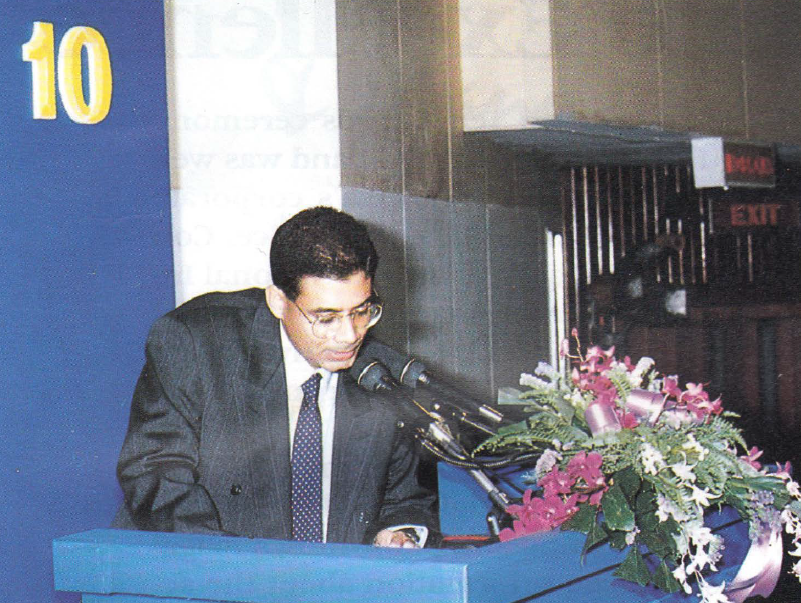Today we are gathered here to recognize the achievements of the private sector and at the outset I must congratulate the “Business Today” magazine for not only recognizing the achievements of the private sector, but also formulating and publishing a public magazine designed to disseminate information about the activities of the private sector and the role the private sector has played in developing our economy.
It is important to note that today, more than 90% of industrial output in Sri Lanka is generated by the private sector, compared to less than 50% in 1980. Furthermore 70% of employment also today is generated by the private sector. It is due to this importance that the government has today, in my opinion, put in place some of the most pro-investment, pro-private sector policies at any time during the post independent history of Sri Lanka. And this is not simply limited to physical incentives, which I consider are merely sufficient conditions for private sector growth but we are focusing on what I call the necessary conditions. These include strict adherence to stabilizing the macro economic fundamentals of Sri Lanka, including the reduction of the budget deficit and inflation commitment to enhancing the infrastructure of our country, in areas such as telecommunication, power, ports and roads.
In particular, I would like to single out the achievements of the telecommunication sector. Last year there was a 33% growth in fixed line telephones installed. Roughly 90,000 new telephone lines were installed by the Sri Lanka Telecom and the private sector, which was three times the average of the previous three years and cellular lines connected grew by 60%.
The plan for the next few years is to focus on a few large scale highway development projects connecting the airport, the central hills of Kandy and the southern highway. The third initiative undertaken by the government is public enterprises reform, where today virtually the entirety of the plantation sector is in the hands of the private sector.
I cannot think of any single major manufacturing enterprise which is not run by the private sector and in the future, increased proportion of services would also be in the hands of the private sector.
I believe that further structural reforms are necessary in order for the private sector to thrive and these include educational reforms particulary to bridge the gap between the opportunities that are created by the private sector and the universities. We need to implement labor market reforms and more importantly we need to implement administrative reforms in order to ensure that we have an efficient private sector and to accelerate the process of economic growth.
I believe that the private sector cannot today sit on its laurels. The time has come for you to be more actively involved together with the government in implementing much needed structural reforms, in creating further opportunities for our youth to benefit from the opportunities inherently available within a free market economy.
Primarily, I foresee that unless major reforms are implemented in our educational system, we will leave an entire generation of intellectually and of physically capable youth from benefiting from the fruits of wealth created through private enterprise.
It is distressing sometimes to know that the pursuance of wealth through entrepreneurship, sometimes at the grass roots level and even academic circles, in universities in particular, is still perceived to fall within the domain of a privileged few, either by virtue of being born into wealth or having attended the right school or having proficiency in English. Going into business is not perceived as an occupation quite in the same league as becoming an engineer, a doctor or a lawyer.
I believe that the rise and fall of the East Asian economic miracle offers good lessons to Sri Lanka. The rise of East Asia was primarily due to religious adherence to the concept of entrepreneurship and creation of an environment by the governments for entrepreneurship to thrive. In fact the late Chinese leader, Deng Ziao Ping glorified the process of accumulating wealth.
However the fall came about due to one fundamental fact and that is that the process of wealth creation lacked transparency and fairness due to cruelism, nepotism and corruption.
In Sri Lanka, our latent entrepreneurial talents have to be harnessed fully and I believe that these can be harnessed through the process of improving infrastructure, availability of bank financing and seed capital.
However there are certain other aspects that we need to look into and these include eradicating the cultural bias against entrepreneurship where the businessman is seen as an evil “Mudalali” if I were to use a much-hackneyed phrase. All you have to do is to look at the cartoons of Wijesoma where the mudalali is portrayed as one who in fact takes unfair advantage. In fact even newspaper articles very often talk about unscrupulous traders making ungainful profits.
I think the concept that virtually 80% of investment in this country is created by retained profits of the private sector, has not yet been insulated within our educational system.
I also believe that while English may be the essential medium of business communication, the lack of ability to speak it should not override the inherent capabilities of an individual. English should be the means to an end and not the end itself. I think action must be taken to eradicate the concept of cultural imperialism perceived to be practiced by the private sector and particularly more so in the period of the 1960’s and prior to independence.
By way of an anecdote;’ I should point out that Sri Lanka became world champions of cricket without a single cricketer being from one of the two so called elite schools. Therefore today, in addition to patting ourselves on our backs, we must reflect on the obligations of the corporate sector.
Firstly, self-regulation, whereby we become good corporate citizens and do not use our privileged status to gain unfair advantage and where we provide equal opportunities for all cross sections of society to access jobs based on sheer ability.
Secondly, you must all work with the government in advising the government on much needed structural reforms in the education sector.
I believe the teaching of economics and subjects related to business must be made mandatory. You must also work with the universities to ensure that graduates that are churned out by these universities are employable. By way of just one example – about one year ago, the vice chancellor of the University of Moratuwa in his explanation as to why less than a hundred graduates in Computer Science are churned out, explained to me that he was fearful that these graduates would either go abroad or would remain unemployed.
However the state today is that in the BOI sector alone, we have more than 600 vacancies for trained software professionals. Furthermore, there is a necessity for us to train the trainers. I find that professors of universities are embracing outmoded economic policies.
Just recently a particular professor espoused the export of rock Phosphate in the Eppawela project as opposed to the export of value added fertilizer. Now I must point out that a very basic economic analysis would show that the net foreign exchange earnings from the export of value added fertilizer generates over Rs 5,000 million over a 30 year period compared to only Rs 400 million if it was exported in simply rock form.
Therefore, in conclusion I would like to suggest that there is a great deal of perception change that we have to engineer in order to disseminate information to all cross sections of society, of the fruits and the wealth that the private sector can create.
In this context, I would go as far as to propose that 1% of corporate profits should be contributed to a special fund to implement structural changes in our education system. Only then will we achieve true economic emancipation.












